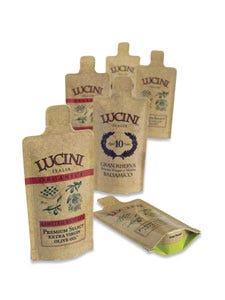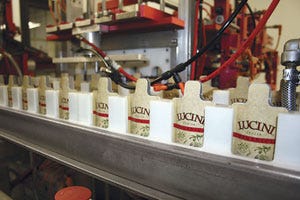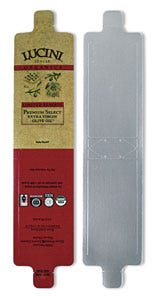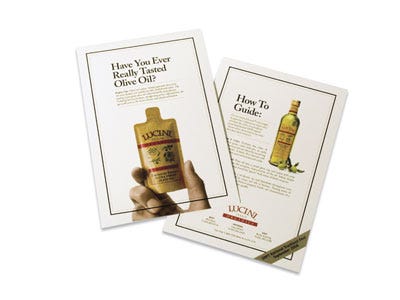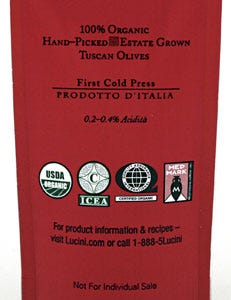Organic foods producer banks on sample packs
January 30, 2014
|
Lucini Italia Co. is a private company that specializes in bringing super-premium Italian products to the U.S., and its gourmet products are catching the eye of chefs and nutritional gurus alike. Founded by Renee Frigo and Daniel Graeff in 1998, the company recently announced a collaboration with Andrew Weil, M.D. to use its limited reserve 100-percent organic Premium Select Extra Virgin Olive Oil™ to help raise funds for the Weil Foundation, a not-for-profit organization dedicated to supporting integrative medicine through training, education and research.
The oils are getting attention for their flavors as well. In an article published July 2008, Cook's Illustrated named Lucini Italia Premium Select Extra Virgin Olive Oil® the front runner in its test of extra-virgin olive oils available at supermarkets. The brand, which began distribution in the gourmet specialty markets, now is available in groceries, natural food markets and even clubstores. “Some brands that are at our level, don't want to sell there,” Lucini Italia president David Neuman explains. “They don't want their brand to be thought of as available in a cheaper format, or you know, in a less glamorous environment. But we are trying to be available to all people.”
|
Traveling down a conveyor in a custom-made form/fill/seal machine on the co-packer's certified organic packaging line, cards line up with their tops agape, ready to receive oil dispensed from the piston filler. |
He does concede that Lucini products still can be at the upper reaches of some people's budgets. “We're a $15 bottle of oil and a $9 pasta sauce,” Neuman explains.
At a time when many consumers are pulling back on luxury items such as $5 lattes, the wisdom of this business strategy might seem questionable. Yet Lucini is experiencing double-digit sales growth this year. The true challenge for Lucini is getting prospective consumers and retailers to take their first tastes of the company's products.
Flavor-independent
Lucini relies heavily on sampling done at tradeshows and consumer events to get people hooked on its high-end products. Traditionally, olive oils and vinegars are sampled using pieces of bread that are dipped into an open container holding the product. According to Neuman, this is not the best way to experience a product's true flavor. He says the olive oil must be able to stand on its own with a clean flavor and a peppery finish.
To encourage this type of sampling, Lucini ordered more than 60,000 standup sample packs from Xela Pack, Inc., (www.xelapack.com) in November 2007. Early this year, Xela Pack produced a little more than 20,000 mL sample packages each for three products: Gran Riserva Balsamico balsamic vinegar of Modena; USDA organic-certified Premium Select Extra Virgin Olive Oil; and Premium Select Extra Virgin Olive Oil.
Meant for squeezing
|
The 13-mm board/foil/film composition of the pouch cards offer good moisture- and oxygen-barrier properties. |
Each standup Xela Pack holds 30 mL of olive oil, which the consumer can squeeze right into his or her mouth. Made with a proprietary paper/foil/film laminate, the packs appeal to companies that are looking for a more sustainable way to sample their products than in plastic bottles. “The truth of the matter is that in the United States, only about 3 to 5 percent of all recyclable materials [used in plastic bottles] are actually recycled,” says Anthony Gentile, marketing manager and art director for Xela Pack, referencing an article posted on the Best Life Magazine website on Oct. 25, 2007, and written by journalist Susan Casey. “So if you compare a Xela Pack to let's say a recyclable bottle that is made with 100-percent-virgin plastic, ultimately that recyclable package is really going to end up, on average, being 95-percent-virgin waste.”
Xela Packs are composed of 75-percent paper, and the paper portion of the packaging is made from 100-percent-post-consumer recycled or 100-percent certified-sustainable, virgin paper fiber. According to the company, the packaging uses approximately 93 percent less plastic than similar size bottles and tubes.
These characteristics helped build the company's reputation within the natural products market long before “green” became more fashionable than the little black dress. “At least since 1997, we have had a tagline— environmentally sound product sampling and trial packaging,” Gentile remarks.
Squeaky clean
|
In its informational sampling card, Lucini italia reminds readers that olive oil is a fruit product and suggests a wine-like tasting approach. |
With its reputation fixed in the natural products realm, some prospective customers began to approach Xela Pack about copacking their organic-certified products.
Making few exceptions, the USDA requires certification of operations or portions of operations that produce or handle goods that are intended to be sold, labeled or represented as organic or made with organic ingredients. The agency accredits third-party organizations or persons as certifying agents for the National Organics Program (NOP).
Because Xela Pack already was adhering to the food and drug packaging requirements put forth by the USDA, the company found that the certification of an existing line went very smoothly. “Each of our machines is in its own cleanroom environment that is set to the standards of USDA food and drug products,” says Gentile. “For us, there wasn't that much that we needed to do to comply with the certification.”
The Global Organic Alliance, Inc., (www.goa-online.org), certified Xela Pack as organic copacker in December 2006.
To ensure continuous compliance with NOP standards, the copacker does need to pay close attention to the ingredients used to clean the packaging line. “There are certain products that clean your floor and your machines really well, and some of these clean so well and are so good because they leave a bit of residue there that can affect the bacteria and other things,” says Gentile. “These types of cleaners can't be used because that residue, if it is not organic, could come in contact with organic product and taint it.”
Persistent paperwork
To ensure compliance throughout the manufacturing and packaging process, organic product-handling operations, such as Xela Pack, need to factor in the time required to complete all the necessary paperwork associated with each job filling certified-organic products. “Not only do we have to go through the certification ourselves, but we have to get information from the supplier to prove that the manufacturer is certified organic,” Gentile explains.
When Xela Pack earns a purchase order for an organic packaging job, the company first sends in the prospective customer's organic certification documentation to the Global Organic Alliance, Inc. (GOA). Once the certifying agent verifies both the company and the product as certified-organic, Xela Pack then submits the packaging artwork for approval. The product is put on the certified-organic packaging line only after GOA has sent the Xela Pack all three approvals.
After the job is completed, Xela Pack files final documentation paperwork with the GOA, which is sent to the USDA as documentation that all certification regulations were handled correctly.
Gentile emphasizes that the burden for documentation is higher for the first job. Subsequent jobs, especially repeat work, require less paperwork from the manufacturer.” “Basically, this paperwork becomes part of our quality control system,” he explains.
Five at a time
|
Use of the USDA Organic seal is regulated through the agency's National Organic Program. |
The Lucini job was filled on the organic packaging line at speeds that ranges from 30 to 40 packs /min. The printed paperboard laminate is die cut into cards, which the operator places into the card holder on the custom-made form/fill/seal (f/f/s) machine manufactured by Xela Pack sister company Gentile Packaging Machinery.
The f/f/s machine forms the bottom, date-codes the pack and heat-seals the sides. The 13-mm board/foil/sealant composition is designed to provide a strong moisture and oxygen barrier in a package that does not leach bisphenol A.
The piston filler dispenses the olive oil into the packs, then heat-seals the top. The f/f/s machine drops the filled packs into a case five at a time. Once the predetermined number of packs has been filled and sealed, which for the Lucini job was 250 packs per case, the operator removes each filled carton from the f/f/s machine, closes and palletizes it manually, and places it into a shipper.
Once a pallet is built, it is enveloped using a stretchwrapper from International Packaging Machines, which now is owned by Nitech (www.nitechindustries.com).
Small packs, big impact
According to Milana Kosova, co-founder of Miloby Ideasystem (www.miloby.com)—the studio that designed Lucini's sample packaging, the feedback has been outstanding. Therefore, the studio now is working with Lucini on charming the premium end of the food-service market with single-serve versions of Lucini gourmet products.
More information is available: |
Global Organic Alliance, Inc., 937/593-1232 . www.goa-online.org. |
Miloby Ideasystem, 212/627-9510 www.miloby.com. |
Nitech, 800/397-1100 www.nitechindustries.com. |
Xela Pack, 734/944-1300. www.xelapack.com. |
About the Author(s)
You May Also Like
